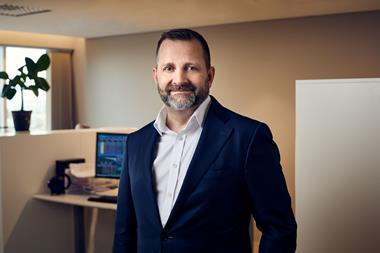Lou ten Cate is probably too laid back to be described as a man with a mission, but he is certainly someone with a vision and with the determination to realise it. “I want to develop a super consultancy, where you would help pension funds on both sides of the balance sheet, not only in asset management but also in relation to benefits and administration.” But most of the work would be outsourced to external parties chosen on the basis of suitability for the client.
Since separating on amicable terms from the US advisory group Wilshire in Amsterdam in 1999, he has formed Investment Management Factory, which is not a rave group, but operates as traditional consultancy, while working on the plans for the new departure planned for later this year.
The split from Wilshire centred very much on the US group’s decision to concentrate more on private equity and absolute returns asset management than investment consultancy. “I had problems with this approach, either you were a consultant or an asset manager. To be both can lead to conflicts. Wilshire’s view was that if you were only in private equity and absolute return strategies only you are not in conflict with the active and passive managers in the other classes. But I still was not comfortable.”
He adds: “So with their agreement I took some of the smaller clients with me.” These provide the income, while he prepares for the new venture. “I am not in the market or new clients for my consultancy business.”
Encapsulating his business, he says: “I want to play a fiduciary role for pension funds.” He sees this as a long remove from traditional consultancy in the Netherlands, with a loose relationship with clients, where they can dismiss you at short notice.
“Under the new, if I am providing the service I want to it is much more a long term contract. You do the benefit administration, which certainly cannot be switched overnight to another provider, so that’s a long-term contract. Similarly, if the client handles both sides of the balance sheet, then the asset management should be for the same period.”
What he sees himself bringing is the ability to assess all of the requirements of the client and choose from the best and most suitable providers of services for each client. “Because I am independent I can use other consultants to help me – so I can easily go the Mercer or Frank Russell and ask their assistance. This means I can move around the market and have contact on all sides.”
If he does decide to provide services directly himself, it will involve just asset allocation and TAA. “I won’t get involved in running portfolios. Other people are much more sophisticated at that I ever can be.”Ten Cate ses the services being of particular interest to smaller and medium-sized pension funds, though he considers funds of up to o4bn as medium sized. In the Netherlands there are over 800 up to this size and just 25 or so over, so it is big market.
“Now with all the developments in the Dutch market, funds are asking advice as to how best to do things, where do they get the personnel, what kind of system do they need for benefit administration and so on. Funds are very under staffed, and it is very hard for them to find the right partners.”
His solution could mean taking over part of the activity of the fund and perhaps even some of the staff. “It enables them outsource everything, apart from the board and their investment committee. But the work that has to be done that is what I would handle. I would not develop my own administration software, but would find the best administration system.” With the supervisory authorities asking for much more information, pension funds are haveing to comply with many more requirements. “These are the things we would look after, all the reporting and supplying the figures to the supervisors and others.”
He adds: “For example, we would have our own actuary on board so as to be abreast of what is going on and to provide services, but we would outsource the actuarial work. You need an actuary to find an actuary.” Consultants with an actuarial service have an advantage, as the relationship on one side opens the door to the other.
Ten Cate says he spent much time an effort finding a suitable backer to help finance the new venture and develop it. “The partner I have found is knowledgeable about pension systems, insurance and about risk management. So they can support me in these areas.” While the name is not disclosed he says it is a big non domestic European institution, which will help him expand outside the Netherlands. “The next step will be to set up a limited Dutch company, then we have to obtain the approvals from the regulators, which can take three to six months to go through. I hope to start with around 10 people.”
On the asset management side, an asset related fee will be charged, “but a very thin fee”, which will probably be more performance related than a fixed fee. “I made the business plan on a Netherlands only and then on a Europe-wide basis. We will start in the Netherlands, and if my results are on target, we will be allowed to go outside. Our view is if it works out in the Netherlands in the first year we are ready to try the other stuff. The UK will be early on as it is a very interesting market and a big one,” says ten Cate.












